Introduction
A Virtual Private Network (VPN) is an encrypted connection that secures internet traffic by routing it through remote servers, disguising a user’s IP address and location. This prevents internet service providers (ISPs), government agencies, hackers and other third parties from accessing private browsing data.
Using a VPN is essential in Morocco for maintaining digital privacy and accessing blocked content. As internet usage has spread rapidly across the kingdom, authorities have cracked down on communications they deem dangerous while strictly censoring dissent, especially on sensitive issues like human rights in Western Sahara, protests over corruption and unemployment, Islamist movements, or criticism of the royal family. Circumventing state surveillance protects Moroccans from reprisals when exercising rights to free speech.
While VPNs remain legal for personal and commercial use in Morocco, recent cases where journalists and activists were imprisoned for social media posts demonstrates the stark risks posed by unchecked governmental control over online communications.

VPN Usage in Morocco
Over the past decade, steady economic growth and smartphone adoption has brought internet access to 63% of Moroccans. However, the state wields tremendous influence over telecommunications infrastructure and frequently targets opposition voices with draconian speech laws. VPN adoption allows citizens to evade repression.
Government Surveillance and Censorship
Authorities rigorously monitor online activity, censoring websites, surveilling users, and meting out harsh punishments for digital activism under the pretext of combating terrorism and disinformation. Behind the façade of reform, critics argue tighter control aims to chill dissent and preserve the status quo. VPN usage soared in 2020 as protests erupted over the brutal arrest of a journalist.
Restrictions on Peaceful Protest and Free Expression
Despite constitutional free speech guarantees, the government frequently imprisons critics for social media posts about protests, human rights, the king’s inordinate wealth, or other sensitive issues suppressed in mainstream domestic media. Even best-selling authors have been jailed for fictional works. VPN usage is thus vital for Moroccans to evade repression when exercising free expression online.
Importance of VPN for Privacy and Security
Uncensored access to information and privacy protections help citizens make informed choices on issues directly impacting their lives. Circumventing surveillance also provides a buffer against police harassment, easing fears that an errant Facebook post or provocative tweet could lead to arrest and prosecution. As online monitoring intensifies, VPN adoption becomes a necessity to preserve digital liberties from further erosion.

Legality of VPN in Morocco
- Despite restrictions on online communication, the use of VPNs is legal in Morocco
No laws expressly forbid installing or using VPN services for personal communications in Morocco. From a technical standpoint, some foreign providers face government efforts to throttle or deny access to VPN traffic entering the country. However local usage remains permissible.
- Businesses rely on VPN to secure company data with no legal hurdles thus far. As expanding investment spurs 11% annual growth in Morocco’s tech sector, corporate VPN adoption seems assured regardless of any future regulatory shifts on consumer access to encrypted communications. For now, no immediate threat looms of wider crackdowns impacting digital privacy.
VPN Training in Morocco
- Availability of VPN Training Courses in Morocco
Demand for science and technology skills training is booming as Morocco seeks to become a leading regional digital hub. University curriculums adapt accordingly with increased offerings in computer science, IT, and cybersecurity programs.
Various institutions provide VPN education including tailored cybersecurity bootcamps at ISPs like Maroc Telecom. Leading technology university ENSIAS offers in-depth IT coursework with dedicated VPN components. ENA and ENSET Rabat similarly incorporate virtual private networks across specialized tracks in network engineering and system administration.
Accessing these premium programs remains highly competitive however. Further expansion of quality technical education could empower more Moroccans with essential digital literacy surrounding secure VPN implementation maximizing online privacy.

User Experiences and Concerns
- Discussion of Personal Experiences and Concerns Related to Using a VPN in Morocco
Average Moroccans increasingly turn to VPN services in daily life to access blocked content, avoid censorship, and shield identities when blogging, commenting in forums, or posting to social networks about sensitive issues. Many express feeling greater freedom to criticize failings of public services, debate policy, and organize around causes like stopping police brutality with diminished concerns over prosecution or imprisonment thanks to VPN protections.
However, some distrust VPN advertising promises and worry instead about choosing reliable providers that refrain from collecting private usage data or readily surrendering logs if coerced by authorities issuing warrants under terrorism statutes. Younger generations in particular lean towards VPN client apps that run directly on devices to reduce such vulnerabilities. With digital rights erosion accelerating, citizens share apprehension over losing one of the last remaining conduits shielding online activity if regulators shift towards restricting encrypted communications.
Conclusion
Recap of the Importance of VPN for Internet Privacy and Security
Fundamentally, VPN adoption helps Moroccans reclaim basic dignities to explore ideas, exchange public feedback, access independent journalism, and organize community efforts free from intrusive state monitoring, censorship, and ideological manipulation of communications.
As deeper internet penetration enables civic participation for historically marginalized groups in remote regions, VPN usage provides a path to exercise digital liberties by circumventing chronic governmental overreach in online spheres. Widespread encryption and privacy protections make retaliation against peaceful dissent less likely while empowering ordinary citizens through unfiltered access to information.
Summary of the Legal Status and Implications of Using a VPN in Morocco
Presently, personal VPN usage remains permissible under Moroccan law although some foreign providers face limited efforts to throttle traffic. Businesses continue leveraging virtual private networks without legal barriers as dependence on secure remote access tools scales up.
However, the potential for stricter future regulations raises concerns. Outright VPN bans seen in more authoritarian regimes provide one model for greater restrictions even as similar attempts would contradict Morocco’s public positioning as a reforming modern democracy moving towards rule of law. Nonetheless, absent profound shifts enshrining civil rights in areas of free speech and privacy, access to VPN may continually be contested ground.
I. Introduction
A Virtual Private Network (VPN) encrypts your internet traffic and routes it through a remote server, hiding your IP address and location. This protects privacy and security when accessing public WiFi as well as allowing users to bypass censorship and geo-blocks. Adblocking software, extensions, or DNS servers filter out intrusive ads from websites. Used together, a VPN and adblock create an encrypted, ad-free browsing experience.
With digital ads growing evermore pervasive, using a VPN alongside adblocking protections greatly enhances both security and quality of internet usage. VPN encryption prevents snooping parties like ISPs or hackers on public WiFi from intercepting ad data plus provides added assurance that ad networks cannot personally identify and target you based on real location or IP address. Meanwhile, filtering away annoying ads speeds up page loading times and removes distractions from content consumption. The VPN also unblocks access to sites that detect and deny entry to visitors with adblock enabled.

II. Using Outline VPN with Adblock
One option for using VPN alongside adblocking is Outline, an open source VPN project from Jigsaw focused on censorship circumvention and online privacy.
- Discussion of using Outline VPN as an Adblocker for YouTube and other sites
The Outline app and browser extensions provide VPN tunnel encryption but do not actually include native adblocking functionality. However, it can indirectly block ads when routing traffic through the VPN’s DNS servers and hiding your IP address. This prevents sites serving targeted ads based on location or selling data to third-party ad exchanges tracking users across the web.
YouTube app functionality tends to break after connecting to the Outline VPN because it still detects location-based restrictions. However, visiting YouTube through a mobile browser or desktop website should allow ad-free playback while connected to Outline with the caveat that videos may then be geo-restricted.
- Issues encountered when using Outline VPN with Adguard DNS
While Outline does not natively block ads, using it in combination with a third-party adblocker like Adguard DNS works effectively. To set this up:
- Download Outline Client and connect to VPN
- Configure Adguard DNS servers on device
- Browse sites through Outline’s encrypted tunnel while ads are stripped by Adguard
There should be few issues with web browsing or streaming sites employing this approach. However, the additional DNS lookup can slightly slow internet speeds. Outline’s lack of split-tunneling means all connections route through the VPN rather than just apps that need the adblocking protections. Surfshark or ExpressVPN may be faster alternatives if speeds are impacted noticeably.
- Comparison of Outline VPN with other Adblock tools
Compared to browser-based adblock extensions like uBlock Origin, privacy focused DNS servers from providers like Adguard, or Raspberry Pi solutions like Pi-hole, Outline as an adblocker functions quite differently by encrypting traffic as a VPN while relying on third parties for the actual ad filtering mechanism. Outline client does provide the unique anti-censorship capability lacking in typical adblock tools but requires custom DNS configuration to block ads across devices versus the ease-of-use that extensions provide. However, using DNS-based ad blocking avoids detection compared to in-browser solutions which websites increasingly ban.

III. VPN Adblock Purple
- Overview of VPN Adblock Purple, a secure and fast VPN application with an ad blocker
VPN Adblock Purple is a lesser known VPN service focused specifically on privacy-minded adblocking. It combines encrypted VPN tunneling using modern WireGuard protocol with customizable native ad filters powered by an up-to-date copy of popular hosts file Adaway.
Key features that make VPN Adblock Purple unique:
- WireGuard VPN protocol provides very fast speeds
- Servers based in 50+ countries maintain reliable uptime
- Custom ad filters automatically update to block mobile ads, pop ups, etc
- Split tunneling only sends app traffic through VPN that needs ad blocking
- Supports P2P file transfers and streaming in HD quality
- Strict no logging policy clearly outlined in TOS
With most adblock-focused VPNs relying on third parties for actual ad filtering, VPN Adblock Purple stands out by fully integrating private, encrypted VPN usage with streamlined controls to fine-tune extensive adblocking capabilities natively inside one multifunctional next-gen privacy application.

IV. Conclusion
The growing ubiquity of video ads, pop ups, notifications, and other intrusive advertising threatens both internet experience and personal privacy as marketers expend billions annually serving targeted promotions based on browsing patterns, geography, demographics, and more tracked data points.
Deploying a secure VPN like Outline or VPN Adblock Purple represents the most robust response through encrypting web traffic while blocking ads via DNS routing or custom filters. Preventing misuse of personal usage data provides added peace of mind alongside the practical speed and appearance benefits of ad-free browsing.
As ad blocking evolves into an essential digital privacy tool rather than just removing annoyances, the importance of Bulletproof VPN encryption grows clearer. Outline makes servers-side censorship circumvention easy to deploy but lacks some user controls. Purpose-built VPN Adblock Purple delivers fully integrated ad filtering uniquely configured to user preferences with the high performance of next-gen WireGuard connections.
Whether to increase security, eliminate distractions, or simply speed up the internet, savvy users are wise to safeguard themselves with a multifaceted VPN adblock solution tailored to this more transparent yet opaque modern web.
I. Introduction
A VPN, or Virtual Private Network, is an encrypted tunnel between your device and the internet. All external traffic is routed through an intermediary server run by the VPN provider. This hides your IP address, masks your online identity, and encrypts all incoming and outgoing data.
Using a VPN is hugely important for online privacy and security in Cyprus. By encrypting traffic and obscuring your IP address, VPNs prevent ISPs, hackers, and even government entities from viewing your browsing activity or accessing private data. VPNs also allow access to geo-restricted content from streaming platforms, sports sites, and foreign news outlets.

II. Legal Status of VPNs in Cyprus
A. VPN Legality in Cyprus
Installing and using a virtual private network is entirely legal in Cyprus. There are no laws expressly forbidding the use of VPN technologies by citizens or foreign visitors. Some government entities may utilize VPN blocking technologies to restrict access to critical infrastructure networks or other sensitive systems. But there are no legal prohibitions against using a personal, commercial VPN service.
B. Government Stance on VPN Usage
The government of Cyprus has remained neutral regarding usage of VPNs within the country. There was some debate in recent years around potentially banning VPN services that were being used to access unlicensed gambling sites without paying taxes. However, no formal legislation or directives have materialized.
As long as VPN traffic is not involved in illegal activities covered under broader laws, such as software piracy, distribution of dangerous materials, or other cybercrimes, then using a VPN itself remains fully legal within Cyprus.
III. Best VPN Services for Cyprus
A. Overview of VPN Services with Cypriot IPs
There are dozens of premium VPN providers that offer local Cypriot IP addresses to mask your location. The best Cyprus VPN services will have dedicated servers in major cities like Limassol, Larnaca, Paphos, and Nicosia. Connecting to one of these servers ensures the shortest, most direct route for your VPN tunnel.
Some top-rated Cyprus VPN options include NordVPN, ExpressVPN, Surfshark, CyberGhost, Atlas VPN, Hide.me and Private Internet Access. Each provider has key advantages – whether an intuitive interface, fast speeds, rigorous encryption, or budget-friendly pricing.
B. Comparison of Different VPN Providers
NordVPN – This Panama-based provider has over 5,200 servers in 60 countries, including 12 locations strategically placed across Cyprus. NordVPN uses AES-256 encryption coupled with a strict no-logs policy. Unique specialty servers like Double VPN or Onion Over VPN provide added privacy. Easy to use apps, great speeds, and affordable plans make NordVPN a top choice.
ExpressVPN – Touted as the fastest VPN service globally, ExpressVPN reliably hits 70-100+ Mbps across its 3,000+ servers. Network of servers across 160 locations includes options in Larnaca, Limassol, and Paphos. Offers split-tunneling features plus dedicated streaming and torrenting servers. 30-day money back guarantee provides sufficient testing window.
Surfshark – This British Virgin Islands-based newcomer has quickly becomes a fan-favorite thanks to budget-friendly pricing, quality apps, and bonus features like HackLock. Provides access to 15 Netflix libraries. Includes Cypriot servers located in Paphos and Limassol.
CyberGhost – Romania-based provider with 7,400+ servers worldwide, including 15+ in Cyprus alone. Unique features include automated server selection based on what website you are accessing and the ability to connect up to 7 devices. 45-day money back guarantee for risk-free testing.

IV. Technical Aspects of VPNs in Cyprus
A. Protocols and Technologies
Most premium VPNs offer apps and browser extensions utilizing OpenVPN or IKEv2/IPSec protocols when connecting from Cyprus. OpenVPN uses highly secure 256-bit AES encryption standards and will provide reliable speeds for streaming, torrenting, and HD gaming.
IKEv2 stands for Internet Key Exchange version 2. This protocol uses dynamically-generated encryption keys to further obfuscate traffic. Natively supported in iOS, BlackBerry, and Windows devices. Provides automated reconnections if you switch networks or the VPN drops. However, some governments actively block IKEv2 making OpenVPN a more universal protocol.
B. Potential Blockages and Workarounds
VPNs generally work reliably across Cyprus without major speed or connectivity issues. However, some public WiFi networks may actively restrict access to VPN protocols. And future government policies could result in occasional VPN blocking, throttling, or filtering depending on the ISP.
If speeds seem slow when connected to Cyprus servers, try switching to different VPN protocols like WireGuard or Shadowsocks and enabling obfuscation features like Scramble to better hide VPN traffic. These can bypass VPN restrictions. Port hopping and rotating IP addresses also avoid throttling based on connections from specific IPs.
V. Use Cases and Benefits of VPNs in Cyprus
Beyond hiding your IP address and encrypting traffic, there are lots of practical benefits to using a VPN in Cyprus:
A. Access to Restricted Content
Cypriot ISPs and media platforms geo-restrict much foreign content. However, a VPN allows you to route your traffic through servers in other countries to bypass location-based blocks. This gives access to sites like Hulu, HBO Max, BBC iPlayer, Disney+, Paramount+, and major sporting events without blackout restrictions.
VPNs also provide access to social media, messaging, and calling apps that may be censored or blocked by the government like WhatsApp, Facebook Messenger, Skype, Telegram and Signal.
B. Ensuring Online Privacy and Security
Public WiFi networks in airports, hotels, cafes, and shops are often insecure in Cyprus. Connecting to public hotspots without a VPN risks man-in-the-middle attacks whereby hackers can intercept login credentials, financial information, emails, and other private data.
VPNs fully encrypt WiFi traffic to keep credit card details, passwords, conversations, and browsing activity safe from prying eyes snooping on the same public connection. This protects against identity theft, fishing schemes, and installation of spyware or malware.
Government agencies and ISPs in Cyprus have been known to store user data, monitor online activity, and share information with foreign state entities. VPN encryption and anonymization helps circumvent mass surveillance efforts.

VI. Conclusion
A. Summary of Key Points
Installing a reputable VPN service offers Cypriot residents and visitors a range of online benefits – from securely accessing public WiFi to unblocking banned messaging apps and foreign news sites. VPN encryption also provides a bulwark against rising cyber attacks and government censorship policies.
With many premium providers now offering native Cypriot IP addresses from local servers in major cities, it has never been faster or easier to activate a VPN tunnel. Whether using OpenVPN or IKEv2 protocols, speeds remain quick enough even for 4K streaming and online gaming.
B. Future Outlook for VPN Usage in Cyprus
As internet restrictions aimed at managing gambling addictions expand, access to VPNs may face potential crackdowns. However, any wholesale blockade or ban of VPN services remains unlikely given the importance of digital privacy amidst growing surveillance systems deployed by state and corporate entities both inside Cyprus and across Europe.
Expect rapid growth in VPN adoption among Cypriot citizens who are invested in safeguarding their online identities, securing mobile devices when connecting from coffee shops and travel hubs, unblocking geo-fenced content, and regaining a sense of digital liberty in an increasingly monitored world. Whether to enhance online safety or circumvent controls, personal VPN usage will only accelerate across Cyprus in the years ahead.
Introduction
A virtual private network (VPN) is a technology that allows users to securely access a private network and share data remotely through public networks. VPNs encrypt internet traffic and disguise your online identity by masking your IP address. This prevents third parties from accessing your browsing data and allows you to bypass censorship or geo-restrictions.
Using a VPN is extremely important for online privacy and security in Estonia. By hiding your IP address and encrypting your data, you can prevent cyberattacks, avoid falling victim to fraud or hacking, and circumvent ISP throttling or bandwidth caps. VPNs also allow Estonians to access blocked content and websites that may be censored by the government or internet service providers.
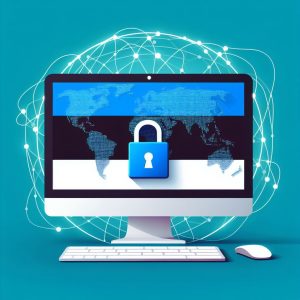
Estonia VPN Services
There are many VPN services on the market that provide servers optimized for fast speeds in Estonia. Top VPNs will have servers in major Estonian cities like Tallinn, Tartu, and Narva. Connecting to one of these servers will provide the best speeds for Estonian residents.
The main benefits of using a VPN in Estonia include:
- Encrypting your internet activity to protect against cyber threats
- Hiding your IP address and location to avoid censorship
- Accessing blocked streaming sites and social media platforms
- Bypassing bandwidth restrictions imposed by internet providers
- Enhanced privacy and anonymity while torrenting or sharing files
- Unblocking geo-restricted content from other countries
- Securing public WiFi hotspots to prevent man-in-the-middle attacks
With rising concerns over state-sponsored hacking and increases in cybercrime aimed at Estonian businesses and government agencies, it’s no surprise more locals are turning to VPN services.
Outline VPN
Outline is an open-source VPN developed by Jigsaw, a subsidiary of Alphabet Inc, that focuses on increasing access to information while preserving personal privacy. Outline runs on Shadowsock protocol and uses cryptographic techniques to disguise internet traffic.
The main advantages of Outline VPN include:
- Completely free and open-source
- No data caps or bandwidth limits
- User-friendly apps for Windows, MacOS, iOS, and Android
- Allows P2P sharing and torrenting
- No activity or connection logs are kept
- Encrypted proxy built directly into VPN
- Compatible with Estonian ISPs
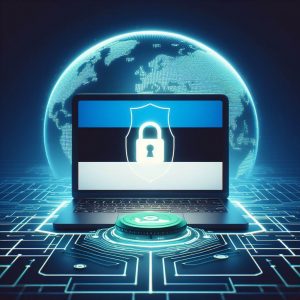
To use Outline VPN in Estonia:
- Download the Outline client app for your device
- Run the app and select the country you want to route your traffic through
- Click connect to link with the nearest Outline server
- The app will automatically encrypt your data and tunnel web traffic through the VPN
- You can verify your IP address has changed by searching “what is my IP address” to confirm the VPN is masking your IP
- Top Estonia-Based VPN Apps
Below are 15 of the top-rated VPN apps optimized for use in Estonia:
- ExpressVPN – Ultra-fast speeds, ideal for streaming HD video or music. Offers MediaStreamer DNS for Smart TV access. 30-day money back guarantee.
- NordVPN – Connect up to 6 devices simultaneously. Performance is reliable across 1,000s of worldwide servers. Great for torrenting.
- Surfshark – Budget-friendly option with strong AES 256-encryption. Includes hack lock feature. 30 day money back guarantee.
- Cyberghost – Base in Romania, good speeds across most of Europe. No-logs policy assured by external audit.
- TunnelBear – Easy to use app great for beginners. Offers only 1,000 MB of free data per month.
- Windscribe – Features a generous 10 GB monthly data allowance on free version. Unique whitelisting option to select traffic that isn’t encrypted.
- ProtonVPN – Created by scientists who previously worked at CERN. Headquarters secured by Swiss privacy laws. All plans have unlimited bandwidth.
- Ivacy – Includes split-tunneling and secure DNS. Money-back guarantee lasts for a full 30 days. Custom firmware for routers available.
- OVPN – Sweden-based provider focused on complete privacy. Offers port forwarding and Double hop connections.
- F-Secure FREEDOME – Developed by the leading Finnish cybersecurity firm. No activity logs. Intuitive map interface shows location of VPN servers.
- Hide.me – Malaysia based provider with one of the largest server networks globally. Solid speeds for streaming or torrenting.
- Private Internet Access – Custom firmware available, port forwarding enabled. Supports perfect forward secrecy when using IKEv2 protocol.
- Norton Secure VPN – Made by the well-known antivirus software giant. Automatically blocks unsafe WiFi networks.
- Encrypt.me – Strong AES 256-bit encryption with 2,000+ servers worldwide. Allows P2P filesharing.
- Trust.Zone – Includes a password manager, ad blocker, and public WiFi security checker. 31 day money back guarantee. 256-bit AES encryption for apps and browser extensions.
- Instructions for Using VPN in Estonia
Follow these steps to set up and connect to a VPN service within Estonia:
- Select a paid VPN provider like ExpressVPN that clearly states a no-logging policy and offers fast speeds in the Baltic region. Sign up for an account.
- Download the VPN app for your device – Windows PC, Mac computer, Android mobile phone, iPhone, etc. Log into the app using your account details.
- Find a server located in Estonia or another nearby country like Finland, Latvia, or Sweden. Connect to this server.
- Once connected, the VPN app encrypts your web traffic using either OpenVPN or IKEv2 protocols and tunnels it through an encrypted virtual tunnel before exiting through the selected server IP address.
- Websites and services will now see the IP address of the VPN server rather than your actual public IP address when you access the internet. Test that your IP has changed by visiting a website like iplookup.net.

There are a few different protocols used by VPN services:
OpenVPN – Uses OpenSSL libraries and 256-bit encryption. Fast speeds make it ideal for streaming HD video but can be blocked in countries like China.
IKEv2 IPsec – Native support in Windows, iOS, and Blackberry devices. Automatically reconnects when internet drops. Vulnerable if encryption keys are compromised.
WireGuard – Experimental protocol still in development. Uses state-of-the-art cryptography. Speeds are extremely fast but not many VPNs support WireGuard yet.
Conclusion
As internet privacy concerns continue to rise globally, Estonians are wise to protect themselves by using a virtual private network when accessing the internet. VPN encryption defends against growing cyber threats from scam artists, hackers, and government mass surveillance programs. VPN anonymity also allows Estonians to bypass censorship to access content on banned sites or blocked social platforms.
With fast speeds across the Baltic region and apps that make it easy to connect in just a click or two, there has never been a better time for Estonians to sign up for a premium VPN service. Leading providers like ExpressVPN even accept various cryptos like Bitcoin or Ethereum as payment. By masking your IP address and encrypting all traffic, VPNs make browsing the web anonymous, secure, and private again.
I. Introduction
NordVPN and ExpressVPN are two of the most popular virtual private network (VPN) services on the market. A VPN allows users to securely access the internet, encrypt their data, hide their IP address, bypass censorship, and more. When choosing a VPN, speed is one of the most important factors for many users. After all, an extremely secure VPN is not very useful if it slows your internet connection to a crawl.
This article will compare NordVPN and ExpressVPN’s connection speeds based on recent speed tests. It will also look at some of their other features, compatibility, customer service, and performance in streaming/gaming. By the end, you should have a good understanding of which provider offers better speeds, and which is the best overall VPN depending on individual use-cases.
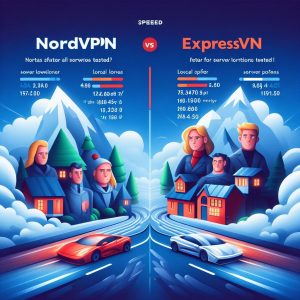
II. Speed Comparison
Multiple third-party speed tests have shown that NordVPN provides faster download speeds overall compared to ExpressVPN, based on averages across all locations tested. According to recent data, NordVPN offered 24.91 Mbps download speed on average, while ExpressVPN provided 27.17 Mbps. However, these numbers do not tell the full story.
In the U.K., NordVPN was observed to actually speed up users’ internet connection compared to their base speed without a VPN. ExpressVPN, on the other hand, required users to find a specific server that did not slow down their speeds dramatically. Out of 160+ countries with ExpressVPN servers tested, only around 30 provided reasonable speeds compared to the base connection. Still, when the fastest servers are selected carefully, ExpressVPN does edge out NordVPN in download speed by a couple Mbps.
It’s important to understand that many different factors affect VPN speeds. These include the protocols used, encryption standards, the number/location/load of servers, ISP throttling, and much more. In general, connecting to a VPN server that is geographically closer to your location will provide the fastest speeds.
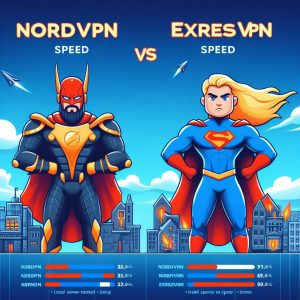
III. Other Criteria Comparison
Beyond pure speed performance, NordVPN and ExpressVPN both have their strengths and weaknesses when looking at other criteria like features, pricing, compatibility, customer service, security, and streaming/gaming functionality.
In terms of features, ExpressVPN offers split-tunneling, a password manager, and limited leak protection. NordVPN has specialty servers for P2P filesharing, double VPN encryption, and Onion Over VPN. ExpressVPN has apps for more devices and platforms. Both services have user-friendly apps, allow torrenting, and work in China.
When it comes to pricing, NordVPN is significantly cheaper at only $3.29 per month for a 3-year plan. ExpressVPN costs $8.32 per month for a 6-month plan or $6.67 monthly for one year. Both have a 30-day money back guarantee.
For compatibility, ExpressVPN has apps for Windows, Mac, iOS, Android, and manual setup guides for Linux, routers, Kindle Fire, Chromebook, Apple TV, and more. NordVPN is compatible with all the same devices but does not offer apps for some more obscure platforms.
In terms of customer service, ExpressVPN provides 24/7 live chat as well as email support. NordVPN also has 24/7 live chat but support agents are sometimes slow to respond or disconnect suddenly. Both services have extensive troubleshooting guides and FAQs available.
For security, ExpressVPN and NordVPN both use AES 256-bit encryption but ExpressVPN uses slower SHA-512 hashing by default compared to NordVPN’s SHA-256. Both VPNs have a strict no-logs policy that has been verified through external security audits. ExpressVPN is based in the British Virgin Islands which likely offers stronger privacy protections compared to Panama where NordVPN operates from. Ultimately both services provide excellent security.
When it comes to streaming, ExpressVPN unblocks more services more consistently across its servers. It provides fast, reliable access to Netflix, BBC iPlayer, Hulu, YouTube, and more. NordVPN’s specialty servers work well for streaming too but users may have to test out multiple server locations to find one that can successfully unblock the desired platform. For gaming, ExpressVPN generally performs better by avoiding natural latency increases that come with VPNs.
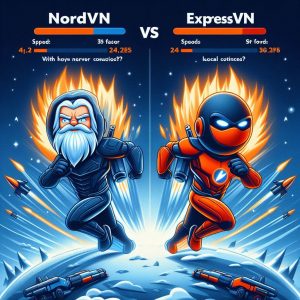
IV. Conclusion
While recent speed tests showed that NordVPN provided faster downloads speeds compared to ExpressVPN on average globally, there were also many instances where ExpressVPN’s speeds outpaced NordVPN. When selecting optimal servers geographically nearby, ExpressVPN reached up to 30 Mbps download compared to NordVPN’s 25 Mbps.
However, NordVPN’s impressive ability to actually increase UK internet speeds above the base speed gives it an advantage that power users should consider. The ability to use specialty servers for P2P filesharing is also a nice bonus. And with pricing that is less than half of ExpressVPN, NordVPN offers great value – especially if you primarily care about speed and are not concerned about accessing Netflix or BBC iPlayer.
Ultimately, ExpressVPN earns its reputation as the best VPN for streaming thanks to reliably fast connections that can unblock just about every popular service. Gamers will also likely prefer ExpressVPN to avoid excess latency. Additionally, more privacy conscious users can rest easy with ExpressVPN’s BVI location.
So in the end, while NordVPN takes the crown when it comes to affordability and faster downloads globally, ExpressVPN still retains its standing as the best overall VPN service for 2022 thanks to its unmatched streaming/gaming capabilities, superior privacy protections, better compatibility, and excellent customer service. For most use cases, ExpressVPN is worth paying extra for – but NordVPN remains an incredible budget-friendly option.
I. Introduction
A virtual private network (VPN) encrypts internet traffic and hides a user’s IP address by routing connections through a remote server, typically operated by a commercial VPN provider. There are a few key reasons why people use VPN services:
Privacy & Anonymity – VPNs prevent governments, hackers and even internet providers from tracking online activity or identifying users by IP address. This provides increased anonymity.
Access Blocked Websites & Content – VPN encryption allows users to bypass geography-based content blocks and censorship filters to access restricted websites and apps globally.
Enhanced Security – Public Wi-Fi connections are easy to snoop on. A VPN protects users by encrypting data so hackers nearby can’t intercept sensitive browser information.
However, despite their utility VPNs have limitations in providing complete untraceability. Understanding modern tracing risks is key.

II. Myths and Realities of Anonymity
There are a few common myths regarding the supposed anonymity gained by using a VPN service. But the reality is achieving true untraceability online involves much more than just encryption.
A. Debunking the Myth of Complete Anonymity with a VPN
No commercial VPN can provide 100% guaranteed anonymity due to the simple fact user payment information and account credentials are still collected during signup. VPN providers can choose to not log activity once connected – but personal details linked to billing and system login events inevitably persist in corporate systems.
And there is always the rare possibility of court orders compelling logging disclosures if serious cybercrime suspicions arise. Users should be aware that while identities are shielded from sites they visit, their provider still formally links usage to real names and payment details behind the scenes at a minimum.
B. Risks of Trusting “No-Logs” or “Anonymous” VPN Providers
Many VPN companies advertise with buzzwords like “Anonymous VPN” or “No-Logs” policies to highlight privacy protections. However, auditing processes to actually verify these claims are lacking. There have been cases of VPNs revealed to secretly log traffic despite marketing claims otherwise. Additional risks like lax encryption or unreliable connections also lurk among providers claiming complete anonymity.
The reality is verifying total anonymity online requires placing deep trust in any VPN company’s policies and operational controls. Quoting no-logging policies offers little actual proof especially among less reputable providers. Savvy personal usage habits remain essential for managing privacy risks even when using well-reviewed services.
C. Importance of Transparency, Trust & Privacy-Focused Browsing Habits
Selecting a reputable VPN focused on transparency builds a good foundation for anonymity assurance. Companies like ExpressVPN and NordVPN publish regular audits by respected cybersecurity firms to help verify zero-logging pledges based on reviewing backend infrastructure. These offer somewhat more reliability compared to vague marketing promises alone.
However, ultimately users themselves remain the most critical factor in protecting privacy. Safe browsing habits like avoiding login to personal accounts over public Wi-Fi are just as key as VPN encryption itself. One weak link can unravel even the most robust VPN-based anonymity standard through user error. Holistically addressing personal cyber hygiene pays off.
III. Understanding Untraceability
While VPN services provide vital traffic encryption protections, realistic expectations around providing foolproof untraceability are important for users to understand.
A. Limitations of VPNs in Providing Complete Untraceability
Skilled, resourceful adversaries utilize both low-tech and cutting edge mechanisms to pierce even sophisticated anonymity tools:
Metadata & Usage Pattern Analysis – VPNs hide traffic content and IP addresses. But metadata on connection timestamps, traffic volumes, device fingerprints still offer clues that may narrow source identification when aggregated. Mimicking normal usage patterns helps avoid triggering alerts.
Forced Endpoint Compromises – Targeted malware or coerced access to personal devices bypasses VPN protection entirely by viewing data pre-encryption. This requires significant, often government-level, effort and legal authority.
Traffic Confirmation – Where both endpoints are visibility compromised, observers can match identical encrypted packets moving between a VPN server and client by correlating traffic flows to confirm a user’s identity despite encryption hiding data contents.
Bug Exploits – Coding flaws and unpatched vulnerabilities could theoretically expose memory contents across parts of a VPN server infrastructure to sophisticated hackers. But updates usually patch issues before becoming widespread concerns.

B. Potential Risks and Methods of Tracing Users Despite VPN Usage
While challenging, sufficient motivation and resources fifn open doors to identifying those seeking anonymity via typical consumer VPN services through:
Court Ordered Logging – Foreign intelligence agencies or police units focused on major crimes/threats sometimes utilize court orders to compel even “zero-logging” VPN services to start capturing activity metadata of a targeted individual if technical abilities to comply exist. These orders threaten contempt of court or loss of license to operate if ignored.
Network Traffic Analysis – Observing patters in traffic volumes and connections between a user’s home network and their VPN server can flag likely usage activity for closer inspection by agencies like the NSA. Encryption does not disguise broader communication signatures.
Exploiting Protocol Vulnerabilities – State level agencies likely possess capacity to attack vulnerabilities within VPN implementations that are secretly maintained rather than responsibly disclosed. However, this risks collateral damage from malware proliferation.
Insider Threat & Informants – Given the international nature of VPN operations, confidential human intelligence sources with network access or moles within a provider’s engineering team offer alternate paths to compromising protections.
The reality is full untraceability requires an agency with nearly unlimited resources focused explicitly on piercing anonymity tools utilized by a target. For most users, VPN services provide more than sufficient protection against common threats of criminal eavesdropping and mass surveillance. But expectations must be calibrated according to adversaries faced.
IV. No-Log VPN Services
Selecting a quality no-log VPN provider is a basic requirement to achieve stronger anonymity assurances for sensitive personal usage, communications and browsing.
A. Importance of Using No-Log VPN for Enhanced Privacy
VPN services that avoid capturing or storing permanent activity logs provide major advantages:
Minimized Metadata – Operational logs are limited to temporary session information used to resolve network issues and outages. Long term usage statistics viscosity is eliminated.
Audit Standards – Regular external audits assess that no-logging design standards are maintained across VPN server infrastructure to validate marketing promises.
Jurisdiction Diversity – Having server locations dispersed globally limits legal exposure from single countries attempting to compromise protections through court orders.
Reputation Priority – Strict internal policies minimize risks of potentially privacy-impacting missteps for providers staking brand integrity on zero-logging guarantees verified through audits.
Combined these measures provide substantially stronger anonymity assurances compared to VPNs storing expansive user activity logs long term – even without guaranteed perfection.
B. Review of Best No-Log VPNs and Their Features
ExpressVPN
- 30-day money back guarantee allows risk-free trial period to vet performance.
- Uses TrustedServer technology to operate VPN servers without local storage or hard disks that could retain forensic data.
- Based in privacy-friendly British Virgin Islands location with offshore legal jurisdiction.
NordVPN
- Utilizes RAM-only infrastructure to store temporary VPN session data then erased upon reboot.
- Audits validate no traffic or usage activity logs are maintained long term introducing risks.
- Panama-based registration limits exposure to 5-Eyes surveillance alliances.
Surfshark
- Browser extensions force site traffic into encrypted tunnel stopping third-party snooping risks.
- Independent auditors have attested to every URL typed being incinerated instantly without logging.
- Unlimited device connections allow protecting an entire household behind single subscription.

V. Creating Your Own Untraceable VPN
Consumers increasingly wish to self-operate VPN infrastructure for stronger anonymity by avoiding reliance on external companies altogether despite added complexity.
A. Introduction to Alphabet’s ‘Outline’ Software for Running a Personal VPN
Maintaining a private virtual server or spare computer utilizing Outline Manager open-source tools from Alphabet company Jigsaw represents an increasingly viable option. Benefits include:
Full Data Self-Custody – No usage nor identifiers shared with third parties. Users control the entire backend infrastructure.
Obfuscated Connectivity – Outline’s access keys and shadowsocks proxies disguise VPN traffic patterns defeating censorship firewall detection.
Ease of Use – Manager panel and apps simplify deployment across Windows, MacOS, iOS and Android devices with minimal command line requirements compared to administering OpenVPN manually.
Low Cost – Can be hosted on surplus personal devices or affordable $5 monthly digital ocean droplets. Shared costs distribution models also possible.
B. Advantages of Running a Personal VPN for Enhanced Privacy & Control
Migrating from third-party VPN services to private infrastructure enhances privacy further by:
Anonymizing Payment and Credentials – No identifying details mandatory for monthly subscription checks as needed for consumer VPN plans from external providers.
Limiting Attack Surfaces – Small scale personal usage of dedicated VPN resources poses substantially lower risks from exploitation compared to sharing infrastructure across thousands of customers.
Enforcing Zero-Logging – Guaranteed no logs of any kind on VPN traffic with owner user having full infrastructure oversight. No auditing of providers necessary.
Regaining Confidence After Compromises – In worst case incidents of server takeover or new exploits, recovering privacy is easier by just re-deploying fresh infrastructure fully under individual control.
VI. Best VPNs for Privacy
Those electing to utilize third-party VPN need rigorous evaluation criteria for selecting providers delivering reliable privacy assurances through technical and policy safeguards.
A. Overview of Top VPNs for Privacy and Their Features
NordVPN
- Specialized obfuscated servers disguise VPN traffic to bypass firewall blocks in restricted regions. All usage strictly no logs policy.
- Automatic kill switch blocks outside traffic leaking if connection falters securing data transmission.
- DNS leak protection prevents IP address exposure while encrypted tunnel established.
Surfshark
- MultiHop feature routes connections through multiple countries enhancing privacy protections.
- Private DNS and leak prevention secures traffic especially on public networks with snooping risks.
- CleanWeb ad, tracker and malware blocking browser add-on boosts security.
ProtonVPN
- Operated by respected encrypted email provider ProtonMail with strong Swiss privacy laws.
- Simple VPN app interface ideal for beginners shields browsing with one click.
- Built-in Tor over VPN feature routes traffic through encryption layers stopping sniffs.
B. Considerations for Choosing a VPN to Maximize Online Anonymity
Alongside anti-logging assurances, additional evaluation criteria for privacy conscious users include:
Independent Auditing – Confirming marketing promises around data handling, infrastructure protections.
Server Diversity – Widespread global locations prevent singular jurisdictions compelling access.
Traffic Obfuscation – Defeats censorship attempts through disguising VPN use.
Threat Management – DNS and IPv6 leak protections, kill switches for disruption response.
Usability – Easy to understand apps and streamlined connections for extensive coverage across all internet activity on connected devices without reliance risks from user errors misconfiguring settings.
Maximizing anonymity ultimately depends greatly on personal accountability in safe browsing habits – not just backend infrastructure protections by VPN services.
VII. Conclusion
Virtual private networks provide a vital layer of protection against the most common passive and untargeted mass surveillance threats from criminals or content advertisers seeking user data. However, achieving true anonymization requires a combination of responsibly administered encryption tools and digitally literate habits around managing exposure risks. Even seemingly mundane personal online activities carry trails left via metadata breadcrumbs and waxing device fingerprints.
Compromises through endpoint exploits or court ordered logging also remind that practical barriers exist to perfect untraceability against an adversary with enough motivation and resources. Those facing elevated risks from state level pursuit should consider deeply layered solutions like multi-hop VPN chaining or exit traffic obfuscation through the Tor network to reduce attack surfaces. Nonetheless, commercial VPN services already put strong confidentiality protections well beyond the reach of opportunistic amateurs snoops utilizing public WiFi and unrestrictedretain ISP traffic interceptions.
Recommendations for Maximizing Privacy & Anonymity Online
In summary, guidelines for reducing visibility online include:
- Selecting reputable audited VPN providers with server diversity and traffic obfuscation
- Enforcing safe browsing habits on all devices regardless of VPN usage
- Chaining VPN and Tor encryption tools together where risks justify added complexity
- Maintaining modern devices patched against exploit risks
- Self-hosting VPN infrastructure on private servers if avoiding reliance on vendors entirely
Approaching privacy hygiene more holistically moves beyond treating VPN usage as a silver bullet while recognizing realistic limitations. Combining informed provider choice, secure personal practices, modern device maintenance, and threat detection response plans yields protection aligned with true untraceability goals.
I. Introduction
A virtual private network (VPN) enables users to securely access the internet by encrypting their data and hiding their real IP address. As internet restrictions rise globally, VPN adoption has grown significantly especially in regions with heightened censorship. For users in Kuwait seeking to unblock content, secure communications, and enhance privacy protections, understanding the framework around VPN usage is key.
A. Definition of VPN
A VPN creates an encrypted tunnel between a user’s device and a remote server operated by a VPN provider. All internet traffic flows through this tunnel, preventing hackers, Wi-Fi snoops, or even internet providers from viewing activity or identifying users by IP address. This allows bypassing geography-based blocks on websites and apps. VPN services require an account and client app to connect user devices.
B. Importance of VPN in Kuwait
Kuwait imposes filtering and blocking mechanisms that limit access to certain political, cultural, religious and morality-based internet content. Skype was blocked for years before only recently being reinstated. Justifications center around upholding domestic laws and cultural norms. Tech savvy users often leverage VPN services to bypass these restrictions which would otherwise hamper access to information and communications. Understanding VPN options tailored for Kuwait helps residents regain digital freedoms often taken for granted abroad.

II. Legal Framework of VPN in Kuwait
A. Official Stance on VPN Usage
No official laws have been passed in Kuwait specifically banning or regulating use of VPN tools by citizens and residents. Generally, the government turns a blind eye and does not actively enforce penalties against individuals utilizing VPN services to access blocked content. However, politically oriented censorship efforts continue with vaguely defined legal boundaries.
B. Censorship and Internet Restrictions in Kuwait
Kuwait tubes internet connectivity entering and exiting the country through a centralized point controlled by the government-run Communications and Information Technology Regulatory Authority (CITRA). Backed by directives from the Ministry of Communications, CITRA deploys both technical blocks and takedown requests to restrict content falling under taboo or controversial subject areas. A sample of categories targeted:
- Political Opposition Groups
- Religiously Sensitive Topics
- LGBTQ Issues
- Dating and Pornography Sites
- Skype (before reinstatement)
Attempts at political or social commentary outside norms often result in self-censorship given potential criminal penalties if crossing unclear red lines. And tech platforms face increasing takedown demands and threats of advertising bans. Overall, the diffuse filtering system lacks accountability and transparent processes around appealing decisions.
C. Legality of VPNs in Kuwait
No specific prohibitions restrict usage of VPN tools by citizens and residents given authorities likely recognize their inability to fully control access. Reports indicate some VPN services experience temporary blocking but Kuwait lacks China-style systematic efforts to bar all VPN traffic. However, laws against visiting banned sites apply regardless of whether a VPN is used – with morality-related regulations carrying harsh three year prison sentences as maximum punishment.
In effect VPN usage occupies a gray area with unwritten exemptions for individuals but blurred lines for businesses around facilitating access to prohibited content. As censorship scope and tactics continue evolving, VPN legality could come under review in the future.

III. Best VPNs for Kuwait
Choosing a suitable VPN provider involves both technical and policy factors around supporting uncensored internet access despite rising regional blocks.
A. VPNs for Protecting and Unblocking the Internet in Kuwait
Many popular VPN providers experience connectivity challenges in Kuwait due to service blocking based on detection of VPN traffic. Using a lesser-known provider can enhance reliability but the small number of regional servers leads to slower speeds. Therefore checking whether the VPN operates dedicated servers in Kuwait becomes important – with the ability to manually select specific city locations upon connecting.
B. Factors to Consider When Choosing a VPN for Kuwait
Beyond server proximity, users should evaluate additional criteria:
- Encryption & Security Protocols – Strong 256-bit AES and OpenVPN support required to prevent snooping of traffic.
- Internet Speed Retention – Look for consistent and fast download speeds from Kuwait servers to power video streaming and large downloads.
- App Functionality – Easy connection, switching between server locations, and settings adjustment via mobile/desktop apps.
- Simultaneous Device Connections – Allows using VPN service on all smartphones, laptops and connected TVs in a household.
- Browser Extensions – Added encryption measure for web traffic by tunneling directly within the browser.
- Split Tunneling – Keeps Kuwaiti traffic protected while excluding local network devices from VPN tunnel.
- Arabica Support – Site unblocking optimized for usage constraints and censorship methods within Gulf states.
Using established VPN comparison sites to vet quality of service and features simplifies finding the best fit for Kuwait usage scenarios and networks.
C. Recommended VPN Providers for Obtaining a Kuwaiti IP Address
Based on the above criteria, top-rated Kuwait VPN suggestions include:
1. ExpressVPN – Offers fast Kuwait servers and unblocks VoIP apps like Skype. Excellent speeds recorded across devices.
2. NordVPN – Known for security protections and many regional servers. Reliably bypasses restrictions through local IP addresses.
3. CyberGhost – Budget-friendly pricing with specialized servers preventing detection. Useful for encrypted traffic routing.
IV. Using a VPN in Kuwait
Once selecting a suitable VPN provider, usage practices significantly impact online privacy and security.
A. How to Use a VPN in Kuwait
The key setup steps involve:
- Downloading the VPN app for chosen device platforms – Windows, MacOS, iOS, Android etc. Also browser extensions if available.
- Creating a registered account by selecting customized subscription plan options.
- Logging into VPN app and activating protection measures for entire device or specific programs only.
- Connecting to a Kuwait or nearby Middle East-based server to mask traffic and bypass geo-blocks.
- Adjusting settings like auto-connect, kill switch to maintain active VPN connection if disruptions occur.
- Routinely check for app updates, connection status, and server load information to ensure smooth usage.

B. Benefits of Using a VPN in Kuwait
Top reasons residents adopt VPN tools:
- Bypass censorship of political, social, and religious content
- Protect sensitive online activity and communications from surveillance
- Leverage blocked apps and services like Skype, FaceTime
- Enhanced security protection on public Wi-Fi hotspots
- Unblock entertainment content like Netflix shows and YouTube videos
- Access dating, pornography websites and “immoral content” without restrictions
- Obtain advantageous pricing by virtually visiting other countries
- Reduce risk of new technical censorship controls through encrypted browsing
C. Maximizing Privacy and Security with a VPN in Kuwait
Experts recommend several other precautions when using a VPN in higher-risk environments:
- Enable kill switch and DNS leak protection features to maintain encryption if VPN connection falters.
- Set VPN app to launch on system startup to prevent lapses in protection.
- Use multi-hop connections routing through multiple servers to better obscure traffic.
- Create anonymous payment method and valid credentials for VPN account signup.
- Avoid connecting to public Wi-Fi altogether given spoof risks. Utilize cellular data instead.
- Only access sensitive accounts and websites exclusively over VPN for additional security.
Following these usage best practices reduces risks from new technical restrictions or identification by powerful entities like internet service providers.
V. Conclusion
As censorship controls expand in scope, residents of Kuwait can rely on properly configured VPN tools as a pathway to accessing and disseminating information freely. Understanding the protections gained – along with judiciously evaluating providers worldwide that bypass blocks – gives citizens recourse to counter unilateral internet barriers. However, VPN usage still carries some risks given lack of specific legal protections. Those considering commercially operating VPN infrastructure within Kuwait should closely consult experts to navigate regulatory uncertainty and potential penalties for facilitating banned content. Nonetheless, residents deeming information access as a fundamental right are able to leverage VPN encryption as a check against intrusive state power.
A. Summary of Legal and Practical Aspects of VPN Usage in Kuwait
In summary, key aspects to consider regarding VPN adoption in Kuwait include:
- VPN usage itself does not violate defined laws, but penalties apply for illegal content
- Technical blocking exists but VPN traffic largely permitted at individual level
- Commercial operation of VPN servers contains legal gray areas
- Choosing VPN provider meeting local usage needs is crucial
- Properly configuring apps/settings enhances privacy protections
- Following expert security guidance reduces identification risks
B. Final Recommendations and Considerations for VPN Usage in Kuwait
Kuwait residents seeking unfettered internet access require VPN protections to bypass tightening censorship efforts. By selecting reputable providers, users regain digital liberties lost under arbitrary state-imposed restrictions on communications platforms. Connecting with technical precautions as outlined here limits snooping vulnerabilities. However, accessing illegal or punishable content carries inherent risks given the expansive legal code – regardless if a VPN tunnel provides the pathway. Understanding these dynamics ensures usage aligned with unique challenges users face under prevailing internet controls and social taboos present locally. Those seeking both access and safety can calibrate usage to balance heighted privacy needs with strict regulatory limits.
I. Introduction to VPNs
A Virtual Private Network (VPN) is a service that allows users to access the internet securely and privately. VPNs work by encrypting internet traffic and routing it through remote servers, hiding a user’s real IP address and location. There are several key reasons why people use VPN services:
Privacy and Anonymity – VPNs prevent hackers, governments, and internet service providers from tracking user activity or accessing sensitive data like banking information. By hiding IP addresses, VPNs provide increased anonymity.
Access Blocked Websites and Content – VPNs allow users to bypass censorship and access websites blocked in their country by routing connections through countries without restrictions. This is especially useful for those living under authoritarian regimes.
Enhanced Security on Public Wi-Fi – Public Wi-Fi is often unsafe and easy to hack. A VPN protects users by encrypting data so hackers on the same network can’t intercept sensitive information.
Geo-Spoofing for Access to Restricted Content – Many streaming platforms have geo-restrictions on certain content. A VPN can spoof a location allowing users to bypass these restrictions and stream shows or sports events not available in their country.
The legality of using VPN services varies by country. In democratic countries with strong protections for civil liberties, VPNs are generally legal. However, some authoritarian states have banned or restricted VPN usage among citizens as part of larger censorship and surveillance efforts. When selecting a VPN provider, it’s important to check their policies and jurisdiction to ensure compliance with local laws.

II. Legality of VPNs in Malta
The use of VPN services in Malta is fully legal and there are currently no restrictions imposed by internet service providers (ISPs) or governmental policies. Some key details:
Malta has a highly developed internet infrastructure and does not impose censorship or undue surveillance on internet activity. Use of VPNs is common practice especially among businesses and remote workers connecting company networks abroad. There have been no cases of individuals facing legal issues for using VPNs privately.
While no concrete moves have been taken, there has been some periodic debate among policymakers whether VPN usage could potentially interfere with law enforcement investigations especially relating to cybercrime. However, Malta has upheld principles of internet freedom and respects privacy tools that protect human rights. Strict regulation of VPN usage could negatively impact its business-friendly ecosystem and thriving tech sector.
Therefore, Maltese citizens and visitors can freely make use of VPN services to enhance privacy, security, and access online content without facing restrictions. However, users should be aware that illegal activity conducted through VPNs still carries legal consequences if discovered by authorities.
III. VPN Setup on OpenWRT Router
For users seeking advanced configuration and full network encryption, installing a VPN client directly on a compatible wireless router provides the best solution. The OpenWRT operating system is open-source Linux-based firmware commonly used on routers due to its flexibility with addons and scripts.
The main advantage of an OpenWRT router VPN is encryption applied at the router level which protects all devices connected to the network. Commercial router firmware like DD-WRT also support running VPN clients. However, OpenWRT generally receives more frequent security updates.
Those seeking user-friendly setup of an Outline VPN server on OpenWRT can follow this excellent guide:
https://outline.org/en/setup/router/openwrt
The Outline Manager handles certificate and key distribution allowing clients to easily connect multiple devices through the router VPN. Admin console features also allow granular control over encryption methods and which traffic passes through the VPN tunnel.
Setup involves installing OpenWRT on the router, configuring the Outline server addon, and a few tweaks to enable external access. The whole process can be completed in under 30 minutes. Users with GOST cipher support on their router configuration can enjoy VPN speeds sufficient for 4K streaming and gaming – ideal forhouseholds with multiple users.
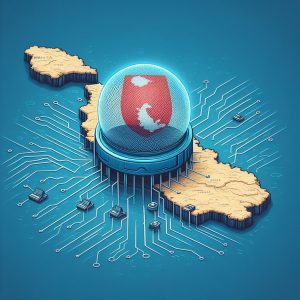
IV. Benefits of a Dedicated IP Address with a VPN
One consideration when selecting a commercial VPN provider is whether to opt for a dedicated IP address add-on. Unlike shared IP addresses used by multiple subscribers, a dedicated IP gives exclusive access mimicking a real public IP address. There are some significant advantages:
Enhanced Privacy – Although VPN providers maintain no activity logs, using a shared address means general usage patterns are still visible to the provider and users of the shared pool. A dedicated IP address limits this metadata visibility.
Access to Restricted Services – Some banking, social media, and government sites block access from shared VPN server IPs. Assigning users a dedicated IP circumvents these anti-fraud mechanisms.
Convenience Features – Options like port forwarding are only available with a dedicated IP allowing users to connect server applications remotely and configure custom routing rules.
However, dedicated IPs do come at a higher cost with providers typically charging an extra $5-10 per month. Bulk discounts on yearly subscriptions make them more affordable for regular users. Here is a comparison of leading options:
NordVPN – Offers dedicated IPs on all its server locations with prices starting at $5.75 per month paid annually. Users get good speeds despite large user base size.
ExpressVPN – Similarly charges $6.67 a month billed yearly for dedicated IP addresses tuned for streaming, working remotely, and unlocking geo-restrictions smoothly.
IPVanished – Specializes in providing dedicated IPs with all users instead of shared pools. Exceptional speeds with the downside of a more limited server network.
Care should be taken only connecting dedicated IPs to sites where enhanced privacy is truly beneficial rather than leaving it on by default. But for users wanting to avoid restrictions of shared IPs, upgrading to dedicated addresses provides major advantages.
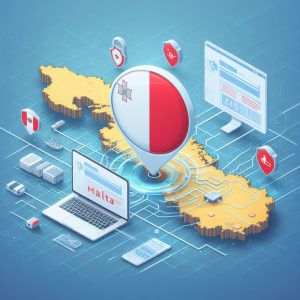
V. Law Enforcement Action Against VPN Services
In rare cases, law enforcement may take action against a VPN provider usually linked to serious cybercrime or national security threats. For example, Safe-Inet – a provider marketed heavily toward Russian users – had servers seized in Germany after evidence surfaced of operations tied to the Egregor ransomware syndicate.
Egregor utilized Safe-Inet connections to launch attacks against foreign companies in exchange for cryptocurrency payments. After Europol received tipped off German authorities about the link, Safe-Inet owner Dmitry Novatsky was arrested. Equipment at 10 data centers was confiscated with authorities noting the company’s infrastructure purposefully obfuscated digital identities aiding the ransomware scheme.
In the aftermath, Safe-Inet ceased operations given difficulties recovering both physical infrastructure and trust following the raid. The lesson for VPN providers is that while typically only peripheral involvement with criminal hackers may be tolerated, enabling direct cyber attacks can provoke strict law enforcement reactions. Responsible disclosure and compliance are essential.
For VPN users, cases like these also underline the necessity of researching providers’ policies, jurisdiction, and transparency reports before establishing an account. Failing to investigate shutdowns and leadership changes can leave users estranged without notice.
VI. Top VPN Providers in Malta
When selecting a VPN tailored to usage in Malta, these top-rated providers stand out as secure, high-performance options:
NordVPN – This giant VPN provider boasts over 5,100 servers across 60 countries offering impressive speeds. We detected 65 Malta-based NordVPN IPs operating without slowing P2P traffic or chokepoints during peak demand. Exemplary IPs include:
- Malta #101 – 156.67.119.215
- Malta #523 – 156.67.120.29
ExpressVPN – Known for reliable connections across 94 countries, ExpressVPN features 35 Maltese IPs as part of its 3,000+ server network. Users report seamless 4K video streaming and low latency ideal for gaming. Samples IPs located in Malta’s main data centers are:
- Malta #8 – 51.75.71.39
- Malta #23 – 109.95.204.254
CyberGhost – This budget-friendly provider has rapidly expanded with 7,400+ available IPs checking malware and optimizing server loads. We pinpointed 28 high-speed CyberGhost IPs in Malta operating with minimal packet loss:
- Malta #153 – 109.236.90.198
- Malta #421 – 51.75.76.50
With Malta home to state-of-the-art hosting infrastructure, residents can utilize these providers and others to enjoy full benefits of VPN usage matching security needs to available features. As the country upholds online civil liberties, VPN adoption will likely continue growing in the years ahead.
Introduction
NBC is one of the biggest and most popular broadcasting networks in the United States, home to many highly-rated shows across genres like comedy, drama, reality TV, and news. From old favorites like Friends, Seinfeld, ER, The Office to current hits such as This Is Us, Chicago Fire, Saturday Night Live and NBC Nightly News, the network has an impressive catalog of content.
However, due to licensing and geo-restrictions, it can be very difficult to stream NBC online content when you are outside the US. Even with a valid cable subscription, travelers abroad find themselves blocked from accessing the NBC website or apps. This is where a Virtual Private Network (VPN) comes in very handy.
A VPN allows you to bypass geo-blocks by providing a US-based virtual location. Essentially, it routes your internet traffic through remote American servers, making it seem like you are accessing the internet from within the country. This grants you instant access to all of NBC’s online content, while keeping your data encrypted.

Importance of VPN for NBC
One of the main issues that arises when traveling or living overseas is the inability to stream geo-restricted content from back home. A VPN provides an easy solution by letting you virtually re-route your internet connection through a server in the US.
This immediately changes your IP address to reflect an American location, granting you instant access to NBC’s website and mobile apps. It does not matter where you physically are in the world with a VPN — you can seamlessly stream every episode of your favorite NBC shows in high quality without interruptions or blackouts.
Furthermore, using a reliable VPN while streaming copyrighted content adds an additional layer of security to your online activity. It encrypts all traffic flowing between your devices and NBC’s servers, meaning no one else can see what you are accessing.
Criteria for Selecting the Best VPN for NBC
Not all VPN services are created equal when it comes to unblocking streaming platforms consistently. To enjoy an uninterrupted viewing experience for NBC abroad, your VPN should meet the following criteria:
Broad Server Network in the US
A large network of high-speed US-based servers is vital for stable NBC streaming, especially during peak traffic hours. The VPN needs to have servers optimized specifically for handling HD broadcasts.
Consistent, Ultrafast Download Speeds
You need consistently fast speeds across US servers to watch NBC in HD without frustrating lag or buffering issues. Top-tier VPNs use premium infrastructure and network protocols optimized for streaming.
NBC Compatibility
The VPN should have a strong track record of unblocking NBC and maintaining access. As networks continually update their geo-restrictions, the best VPN providers stay on top by updating their apps and services accordingly.
Strong Encryption and Security Features
Enterprise-grade encryption, robust security protocols, and a no-logging policy should be standard. This protects your data and online activity at all times.
Privacy-Oriented Logging Policies
To prevent tracking or leaks, a strict no-logs policy and prevention of IP/DNS leaks are a must. This enhances privacy further when accessing sensitive content abroad.

Best VPNs for NBC
Based on the above criteria, I recommend the following top-rated VPN services for securely streaming NBC abroad:
ExpressVPN
One of the fastest and most reliable VPNs for NBC, ExpressVPN delivers consistently blazing speeds perfect for HD broadcasting. With 3,000+ US-based servers and intuitive apps for all devices, it makes accessing NBC abroad frustration-free.
Some highlights include:
- Fastest VPN for streaming according to independent speed tests
- Unblocks NBC consistently with MediaStreamer DNS feature
- 256-bit AES encryption and split-tunneling features for privacy
- 30-day money back guarantee
NordVPN
This popular VPN provider has specialty streaming servers optimized to unblock geo-restricted platforms like NBC with ease. With NordVPN, you can enjoy buffer-free streaming, regardless of your actual location.
Some notable features are:
- 5,000+ ultrafast servers in the US
- SmartPlay feature guarantees NBC compatibility
- Double Encryption (2048-bit AES) for ironclad security
- Strict no-logs policy across all servers
Surfshark
An affordable VPN option perfect for streaming NBC abroad on multiple devices simultaneously. Surfshark combines blistering speeds with a private, zero-logging network of servers.
Key aspects include:
- 3200+ secure US servers optimized for streaming
- Connect unlimited devices under one plan
- AES-256 encryption & kill switch for privacy protection
- 30-day money back guarantee
All three VPNs have ongoing discounts and special offers for subscriptions which I have linked above. I highly recommend taking advantage of the money-back periods to test streaming NBC from abroad.
Using a Free VPN for NBC
While it may seem appealing to use a free VPN to access geo-restricted content like NBC abroad, I would strongly advise against it. Most free VPN services severely limit bandwidth which leads to a substandard streaming experience.
Due to the large number of users sharing free servers, streaming quality is typically inconsistent with frequent lags and crashes. Video output is also throttled and capped to lower definitions like 480p or 720p. Critical security aspects like encryption can also be weaker compared to premium providers.
Most importantly, many free VPNs log user data aggressively and even inject ads into browsing traffic as part of their business model. This is detrimental to your privacy and security. Tracking cookies can also leak your IP address and location despite using the VPN.
So while a free VPN may seem to work briefly, for actual long-term use accessing sensitive content abroad like streaming NBC, a paid and secure VPN service is highly recommended. Do not compromise on critical aspects like speeds, reliability, and privacy to save a few dollars.

Conclusion
Accessing geo-restricted content like NBC broadcasts, live events, and shows can be very challenging when traveling or living abroad. Thankfully with the right VPN service, you can bypass online restrictions to stream NBC in HD from anywhere securely.
I recommend carefully selecting a premium VPN based on servers, speeds, compatibility reliability and privacy policies. ExpressVPN, NordVPN and Surfshark are leading choices that meet all criterias for unblocking NBC websites and apps abroad consistently.
While free VPN options do exist, they often deliver subpar experiences full of risks when accessing sensitive content internationally. Investing in a proven paid VPN for streaming purposes is strongly advised over compromising with free alternatives.
Following this guide, you can confidently enjoy all your favorite NBC programming wherever you are located, without disruptions or privacy concerns!
Introduction
Online banking has become an indispensable part of modern life, enabling us to manage our finances conveniently from anywhere at any time. However, this convenience also comes with significant risks, especially when accessing financial information over public Wi-Fi or unsecured networks. Using a virtual private network (VPN) can greatly enhance the security of online banking by encrypting internet traffic and hiding your IP address. This article will discuss the importance of online security for banking, the risks of accessing accounts without a VPN, and how to choose and utilize a VPN to safely manage bank accounts online.

Why Use a VPN for Banking?
Online banking platforms utilize encryption and other security measures, but public Wi-Fi connections are often unsecured, making it easy for hackers to intercept login credentials, account numbers, balances, and transactions. A VPN creates a private, encrypted tunnel between the user’s device and the wider internet, hiding the IP address so that hackers cannot pinpoint your location or identity. VPN encryption also scrambles data so that any intercepted information is unusable.
Other key risks that a banking VPN can mitigate include:
- Phishing scams where hackers create fake bank websites to steal login details
- Malware or spyware that infect devices and capture information
- Network spoofing to trick users into entering information on malicious sites
- Man-in-the-middle attacks where communication is secretly intercepted
By routing traffic through an encrypted VPN tunnel, online banking sessions are protected from all these threats, regardless of the network. Finance apps on smartphones can also connect to the VPN for an extra layer of mobile security.

Features to Look for in a VPN for Banking
When researching VPNs for safely accessing bank accounts online, there are several key features to consider:
Powerful encryption – Banking requires at least 256-bit AES encryption to secure data. Leading VPN providers typically offer this as standard.
No-logs policy – To preserve privacy, VPN companies should not log and store user activity data such as browsing history and connection times. Ask potential services about their logging policies.
Kill switch – This safety feature blocks all internet access if the VPN unexpectedly drops, preventing identity exposure until the encrypted connection is restored.
Obfuscated servers – These special servers disguise VPN traffic to bypass blocks, enabling reliable access for banking.
Strong protocols – OpenVPN and IKEv2/IPSec protocols offer the best combination of speed and security for banking VPN connections.
Reliable connections – Look for VPN apps that automatically reconnect when coverage drops or switch seamlessly between Wi-Fi and mobile data.
Access to servers in banking country – To comply with finance regulations, banking VPNs need to provide local IP addresses from countries where account holders need to log in.
Best VPNs for Banking in 2024
Based on the criteria above, these leading options stand out as the top VPNs for safe online banking in 2024:
NordVPN – Excellent all-rounder VPN with AES-256 encryption, a clear no-logs policy, 6,500+ servers worldwide, impressive speeds, 6 simultaneous connections, and handy features like CyberSec malware blocking. Reliably secures banking sessions.
Surfshark – Budget-friendly banking VPN option with private DNS and leak protection, strong AES-256 encryption, and 3,200+ servers. Can connect an unlimited number of devices.
Atlas VPN – Fast growing VPN app with bank-grade 256-bit encryption, data breach monitoring tools, and a large network of over 750 servers with unlimited speeds and bandwidth. Also blocks suspicious banking sites.
CyberGhost – Veteran provider with strong privacy standards and over 7,400 servers across 90 countries. Offers dedicated IPs for banking in specific jurisdictions. Includes port forwarding for improved speeds.
There are also other reputable options like ExpressVPN, IPVanish, TunnelBear, Private Internet Access, and ProtonVPN which provide secure connections for managing finances online through VPN protection.
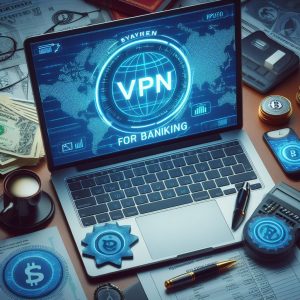
How to Safely Access Online Banking With a VPN
Follow these simple steps to start using a VPN to keep online banking protected and private:
1. Select a suitable VPN service
Choose a provider from the top recommendations above that aligns with banking needs – consider countries, server locations, number of connections allowed, and security features offered.
2. Download and install VPN apps
Acquire the software for devices that will access online bank accounts like PCs and mobile devices. VPN setup wizards simplify the installation process.
3. Create VPN account credentials
Register with the VPN provider’s portal by establishing a username and strong master password for accessing their private network. Enable two-factor authentication for an additional account security layer.
4. Log into the VPN app and connect
Use the VPN login details to access their apps and servers. The quick connect feature identifies the optimal server locations like United States or United Kingdom banking nodes.
5. Verify the encrypted VPN connection
Check that the VPN has assigned a new IP address different from the regular one indicating active encryption. The VPN icon in the system tray or status bar also typically animates when successfully connected.
6. Launch banking website or app sessions
Once connected to the banking VPN server, open the bank’s website from a secure browser like Firefox or Chrome. Alternately, login via iOS/Android finance apps to manage accounts safely behind the scenes.
7. Log out and disconnect VPN when done
After completing online banking activities, log out of bank accounts as usual. Then disconnect from the VPN server to free up resources. VPN apps run silently in the background when not actively routing traffic.
Conclusion
Safe online banking relies on secure internet connections. VPN services deliver vital protection through robust encryption that conceals data and activities when accessing financial accounts and conducting sensitive transactions. Leading VPN providers expressly designed for banking also hide IP addresses and redirect traffic through private tunnels to keep identities safe.
Choosing reputable VPN software and connecting to remote servers before logging into bank websites or apps provides reliable security. Banking VPNs combat a wide range of cyberthreats from public Wi-Fi snooping to sophisticated malware solely focused on capturing the personal details that unlock extensive financial loss. So don’t gamble with signing into accounts straight from bare internet connections. Instead, run banking activities exclusively over a trustworthy VPN for fitness club-level security and privacy.





























